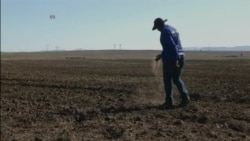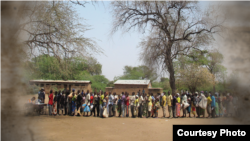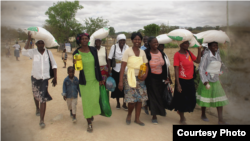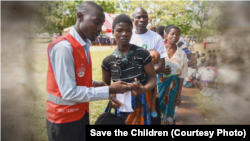Several provinces in South Africa have recently been declared drought disaster areas, leaving some farmers in serious financial trouble and raising the possibility of food shortages across the country.
David Orr, the World Food Program's representative in Johannesburg, told VOA that "we should be now having very heavy rains. It has not happened. It’s extremely hot where I am. Farmers can’t farm their crops because there is no rain and their livestock are dying. This situation is being replicated in much of the region.”
He said countries hit especially hard included Malawi, Zimbabwe and Madagascar. In all, the WFP said, an estimated 30 million people in southern Africa don’t know when their next meal is coming.
Orr said the WFP's first task has been to assist the most vulnerable. He said that although donors have been generous, “these are multimillion-dollar assistance programs. In Zimbabwe, for example, we need to raise $55 million. ... We are about 50 percent funded, I believe. It’s extremely difficult
"This is the big challenge not just for WFP but for all aid agencies with so many huge humanitarian emergencies around the world: Syria, Iraq, South Sudan and Yemen.”
Depending on the situation, WFP gives food assistance and, if possible, cash assistance. The latter option has the advantage of giving people some autonomy and also injecting some cash back into local economies.
El Nino factor
Orr said another complicating factor has been the El Nino weather pattern, which is blamed for the drought. “What we are looking at," he said, "is not just one bad season, which some of the countries have been coming out of, but another bad season the countries are going into.”
Malawi, for example, has been hit with the double whammy of floods and late, erratic rains. Matthew Pickard, Save the Children's director in Malawi, said the country recorded a deficit in maize production, one of its principal crops, for the first time in 10 years.
“We have a combination of floods which wiped out a lot of the standing crops and then the short growing season," he said. "Dry spells [affected] principally maize, because it’s the crop that 80 percent of subsistence farmers are growing. There was also an impact on legumes, beans and some of the cowpeas that are grown.”
Pickard told VOA this meant that families and children don’t have enough food to meet their nutritional requirements. It also means some families are existing on one meal a day instead of three.
The government in Malawi recently made an emergency appeal for $140 million, of which about $90 million has been raised, Pickard said.
He said Save the Children and partner organizations were trying to help 450,000 people in the country.
Pickard said cash has been an efficient and effective mechanism for ensuring that people can get sufficient food.
"So rather than trucking in 100 metric tons of maize and all the cost involved in shifting volumes of food, it’s more efficient to move money into those markets," he said. "It can also stimulate it, because people are buying from local traders, and in turn the local traders are buying other commodities from the local markets."
Through a mobile cash transfer program, 82,000 families have been reached since October, Pickard said.
Both Pickard and Orr said that since the region's growing season is starting later and ending earlier, researchers need to examine what can be done to build more resilient households and communities so they can better withstand shocks like these.








